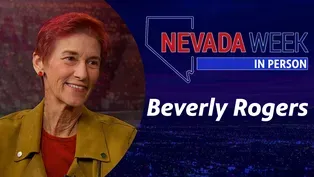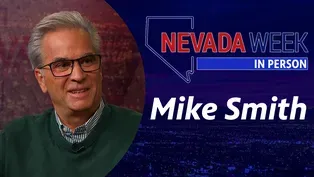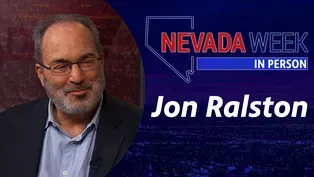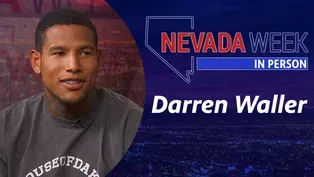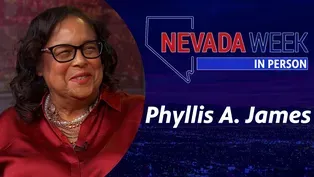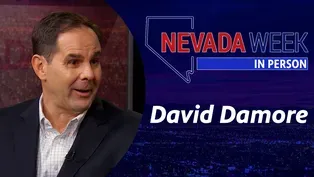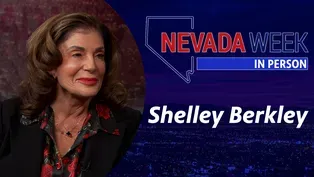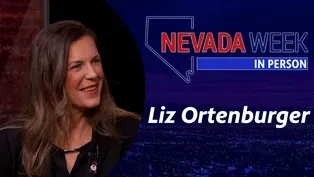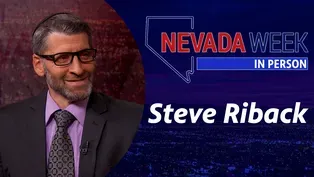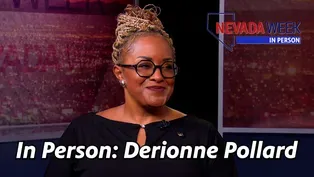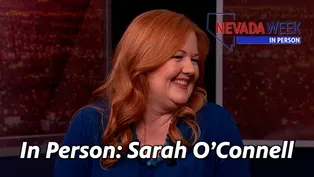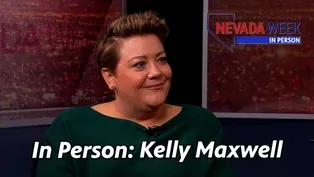
Nevada Week In Person | Julie Murray
Season 1 Episode 37 | 14mVideo has Closed Captions
One-on-one interview Julie Murray.
One-on-one interview Julie Murray.
Problems with Closed Captions? Closed Captioning Feedback
Problems with Closed Captions? Closed Captioning Feedback
Nevada Week In Person is a local public television program presented by Vegas PBS

Nevada Week In Person | Julie Murray
Season 1 Episode 37 | 14mVideo has Closed Captions
One-on-one interview Julie Murray.
Problems with Closed Captions? Closed Captioning Feedback
How to Watch Nevada Week In Person
Nevada Week In Person is available to stream on pbs.org and the free PBS App, available on iPhone, Apple TV, Android TV, Android smartphones, Amazon Fire TV, Amazon Fire Tablet, Roku, Samsung Smart TV, and Vizio.
Providing Support for PBS.org
Learn Moreabout PBS online sponsorshipMore from This Collection
Nevada Week In Person | Beverly Rogers
Video has Closed Captions
One-on-one interview with Rogers Foundation chair Beverly Rogers. (14m)
Nevada Week In Person | Mike Smith
Video has Closed Captions
One-on-one interview with Las Vegas Sun political cartoonist Mike Smith. (14m)
Nevada Week In Person | Jon Ralston
Video has Closed Captions
One-on-one interview with The Nevada Independent CEO Jon Ralston. (14m)
Nevada Week In Person | Darren Waller
Video has Closed Captions
One-on-one interview with Las Vegas Raider tight end Darren Waller. (14m)
Nevada Week In Person | Phyllis A. James
Video has Closed Captions
One-on-one interview Phyllis A. James. (14m)
Nevada Week In Person | David Damore
Video has Closed Captions
One-on-one interview with Chair of the Department of Political Science at UNLV David Damor (14m)
Nevada Week In Person | Shelley Berkley
Video has Closed Captions
One-on-one interview Senior Vice President for Touro University Shelley Berkley. (14m)
Nevada Week In Person | Liz Ortenburger
Video has Closed Captions
One-on-one interview with SafeNest CEO Liz Ortenburger. (14m)
Nevada Week In Person | Steve Riback
Video has Closed Captions
One-on-one interview with Las Vegas Metro Police Lieutenant Steve Riback. (14m)
Nevada Week In Person | DeRionne Pollard
Video has Closed Captions
One-on-one interview Nevada State College President DeRionne Pollard. (14m)
Nevada Week In Person | Sarah O’Connell
Video has Closed Captions
One-on-one interview with Director of Eat More Art LLC Sarah O’Connell. (14m)
Nevada Week In Person | Kelly Maxwell
Video has Closed Captions
One-on-one interview with Baby’s Bounty Executive Director Kelly Maxwell. (14m)
Providing Support for PBS.org
Learn Moreabout PBS online sponsorshipFrom cofounding Three Square Food Bank in 2006 to helping launch Delivering With Dignity, a food delivery system for Southern Nevada's most vulnerable families in 2020, philanthropy expert Julie Murray joins us this week for Nevada Week In Person.
♪♪♪ Support for Nevada Week In Person is provided by Senator William H. Hernstadt.
Welcome to Nevada Week In Person.
I'm Amber Renee Dixon.
Julie Murray grew up in Las Vegas, graduated from UNLV, and has played a key part in the creation of several highly regarded organizations and public-private partnerships with significant social impact in Southern Nevada.
Julie Murray, thank you so much for joining us for Nevada Week In Person.
(Julie Murray) Thank you.
It's my pleasure.
-You have made a career of identifying a social issue or even having a government official approach you with a social issue, and you address it by bringing together the right people and organizations.
And these are issues that require a mass scale response.
The world certainly needs more people like you.
So how would you advise someone who wants to impact in the manner that you have on such a large scale, hundreds of thousands of people in Nevada?
-Great question.
Thank you.
It's interesting that with our population here approaching 3 million, if everyone would do just one thing and find their passion--whether it's seniors, at-risk youth, food insecurity, climate, and water--and experiment with volunteerism, giving cash or in-kind, and find their purpose, I believe then that they would be on a path to really make a significant impact.
-So is that how you started, and then it grew into such a mass operation?
-Yes.
In high school-- I'll credit my high school with requiring that we all, as teenagers, got involved in giving.
And my first volunteerism was at the Children's Behavioral Center on West Charleston.
And interestingly, at this point in my life, I'm very active in teen mental health, suicide prevention.
It started from when I was 16.
So I love when teenagers get involved to find something that matters to them and engage passionately.
-It's interesting you say that in high school it was a requirement for you to get involved in some sort of volunteer work.
Speaking about-- Or in giving, specifically, giving in terms of Nevada, how well do Nevadans give compared to the rest of the country?
-I believe there's so much heart and passion for our members in the community to give.
However, we only rank 44 out of all the states in the nation.
Utah and Colorado are toward the top, but there is still so much generosity here.
And as you know, the community is growing so fast.
I think we're the number one state in growth for five years.
Many people just have moved here, and they don't know where to give or how to give.
So it's up to us that have been here for a while to invite them in and share with them ways to give.
-If there was a way to give, top of mind for you right now, what would you say?
-I would say education.
Education is something so vital to our community.
And whether it's one of your viewers who is a parent that can go and volunteer at their child's school or helping with the after school meals or in any way they can support education, I believe that's the number one most pressing topic in our community.
That, when we do it well, it makes our community vibrant, healthy, and a great place to live.
-And how crucial that you have provided various ways to do that at all sorts of different levels.
In almost everything I've read about you, the word "strategic" is attached to philanthropy, strategic philanthropy.
Why?
And at what point did that become so important to you?
-I don't know if you've ever volunteered someplace, and you show up and it's unorganized.
And it feels like it might not be a good use of your time.
Or you've made a cash donation, and the impact wasn't as great as you wanted it to be.
It's disappointing.
So we hope that all funders have the type of experience where when they give a dollar, the impact is the greatest it can be.
When they volunteer their time, they show up and the nonprofit welcomes them, it's efficient.
Because when it's a strategic impact, they'll want to give more and do more.
-Feel that their time is valuable.
-Absolutely.
-All right.
I mentioned the Three Square Food Bank, Delivering With Dignity.
I did not mention the Andre Agassi charter school that you helped to found; the mental health initiative, Hope Means Nevada; the Moonridge Philanthropy Leaders Summit, the Moonridge Group being the philanthropy consulting firm that you now head.
Out of everything you've done, where do you think that strategic philanthropy has best been applied?
-At Moonridge Group, because we like to be the humble center of philanthropists, the funders, and the nonprofits in the community to be able to be that bridge for excellent impact.
As an example, we're very active in youth mental health.
And one story is that because of our being that bridge, there is a father that lost his teenage son in the COVID years, in 2020, and we now are actively engaged in youth mental health, spreading awareness.
It's okay not to be okay.
Philanthropy did that.
And I spoke to the dad as I was driving over here today, telling him I was going to be on the show.
And he said, Make sure that people know philanthropy matters; that when those in the community engage whatever it is--mental health, teens, seniors--it moves the needle, and it's a better place because of it.
-You spoke about mental health being something that was brought to your attention as a teenager.
It's still prevalent.
Is it more prevalent now?
How does it compare?
-Oh, my goodness.
During COVID, it broke my heart to see so many of our young teenagers and even middle schoolers struggle.
And so when that happens, it's difficult to not want to jump in and do something to make an impact.
So we did launch Hope Means Nevada April 18, 2020.
It was when Lady Gaga did her first mental health virtual concert on TV.
And we launched it during her concert.
And it's because the teens were struggling with isolation, suicide numbers were increasing.
And philanthropy made that difference.
Philanthropists gave, teens received help, and it's just such a beautiful thing to see.
-And part of Hope Means Nevada is providing adequate response to these teens and youth.
There's also an aspect of messaging.
What does that involve?
Why is it important?
-Because, often with our young people, the best way that they can hear the messaging is through social media.
And so the messaging has been vitally important to be able to remove the stigma and be able to say, I'm not okay, and get help.
-And is that what it is saying, I'm not okay?
-Yes, yes.
That we should all be asking five of our friends, How are you doing today?
And when someone says, Not well, that they understand through the messaging where to send them and what to do.
-And how did you go about establishing that as the best type of messaging.
-Through strategy-- -There you go.
- --and lots of research.
-Very, very good.
And I imagine that is an important aspect of all the work that you do, strategic social impact.
Of your accomplishments, anything that you are particularly proud of?
-My children.
And then probably Three Square was the most impactful, in that it reached the most number of people.
And food insecurity is something that we can all help with.
And it's beautiful to see young people, older folks, or everyone in between be able to help with backpack bags full of food or donate food or donate money and time.
So that one was very meaningful.
-And that was something you founded at your kitchen table.
-That's right.
-What does that show about how philanthropy can start?
-Absolutely.
It happens in the backyards and around dining room tables all over the country, that when like-minded people get together and say, I'm upset about this, I want to do something about this, there's a will to act, and then putting the strategy to it can change the world.
-So launched Three Square Food Bank in 2006.
You had to endure the Great Recession with less donations, but an increase in need.
What did you learn from that experience?
-That volunteerism was so important during the Great Recession.
In those years, we had so many people that came in and volunteered because they said, I haven't worked for 67 days and I needed to put on something nice, go out and feel good.
And giving creates happiness.
By giving back, we've noticed that people feel better.
It gives them a purpose.
So during the Great Recession, lots of volunteerism to get through those very difficult years.
However, during COVID, we couldn't volunteer, so the impact on our happiness was severe.
-Yeah.
An issue that is exclusive to COVID, when you cannot be in person.
How has volunteerism-- Has it rebounded?
-Oh, it has.
It's so outstanding.
As you know, we have our Philanthropy Summit coming up, and we'll be releasing the latest findings from our Corporate Giving Report.
It's just one of three in the nation where in Nevada-- In Nevada, we track giving.
Volunteerism is up.
Financial giving is up.
In-kind giving is up.
So sometimes difficult time periods like we were through and COVID make us stronger and better, and Las Vegans are giving better than they have in many years.
-Any lessons learned from COVID?
-Yes.
The importance of connection, the importance of making time to do something as basic as connecting with friends and keeping our own mental health in a good position.
-You also launched, in addition to Hope Means Nevada in 2020 amid the pandemic, you launched Delivering With Dignity.
What is that?
How is it going?
Is it still running?
-Do you know we have people that will say, I will never give up my Monday driving shift, because people got great pleasure out of going to the restaurants, picking up the restaurant food, driving it to families who were impoverished and could not get out.
And so the volunteers and the donors have been getting just as much joy as those families that when the drivers show up, they're all volunteers, that they get this nutritious meal that was made by restaurateurs.
It's-- Sadly, the need is still there.
So it's still going, and we imagine it will be going for a few more years.
-Does it surprise you that you started with food insecurity, and here you are still addressing the same issue?
-Yes, still, it does.
And the biggest hope is that we would never have to have a food bank or a Delivering With Dignity, because no one would go hungry.
But we haven't accomplished that yet.
We're trying.
-So you started in corporate responsibility, corporate social responsibility with Caesars.
What has the development of that been like over the years?
How well known, how well versed were people in it back when you started?
-What's interesting is over the years CSR and now ESG is part of a company's DNA and a culture.
And it used to be a "nice to have," it would be nice to have corporate giving.
Now companies that don't embrace community engagement, volunteerism, they get left out.
I think a lot of young folks want to shop at a place that engages in community.
They look for companies that are giving back.
And that's the brand awareness that comes from corporate giving much more so now than just years ago.
-Are there still corporations out there not embracing it?
-There are, and we're working to find them, get them on board.
-And your message to them?
-Yes.
Engage.
It enhances their brand.
It improves employee morale.
They will be left out if they don't engage in community impact.
-One thing that stood out to me on your LinkedIn was, gosh, back in the day you were helping with affordable housing for seniors, assisted living, utilizing Bureau of Land Management land.
That's an issue that Southern Nevada is currently facing.
How were you able to pull that off?
-Collaboration.
Isn't it beautiful when government, public-private partnerships occur and everyone brings something to the table?
And so that one was using, as you know, public lands to put a senior assisted living site-- And it's still there today.
In fact, I drove by it not too long ago.
But when we collaborate, we're so much stronger.
And that one was a beautiful example of collaboration.
-Last question for you.
Of all the issues out there, what is the most pressing social issue in Southern Nevada right now?
-Education still.
We still have a long way to go, but much progress has been made.
The teachers and principals and school district is working very hard.
We have some excellent leaders in that area.
There's more work to do, but we're making progress.
It is still the number one pressing issue.
-Yes or no, any plans to run for office in the future?
-No.
I am super happy with my philanthropy role and feel very grateful for the community to be able to serve here.
-Julie Murray, thank you so much for joining Nevada Week In Person.
-Thank you.
♪♪♪
Support for PBS provided by:
Nevada Week In Person is a local public television program presented by Vegas PBS
